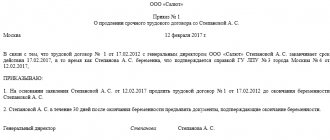Today we are going to look at sample characteristics for managers. This document is extremely important for anyone who is going to work for a new company or transfer to a higher-ranking position. The thing is that not everyone knows exactly how to write characteristics for certain frames. What points should you pay attention to first? What should and should not be included in a manager's profile? What rules should you use to draw up a document that meets all the standards? It is enough to remember just a few points.
By the nature of leadership
Sample characteristics for managers may not look the same or specific. After all, the direction of management’s activities plays a huge role. That is, what the boss did. Defining the activity is the first step towards writing a good profile.
This point should help you decide what exactly to include in the document. Why? Because every profession and field of activity has its own key points. They must be reflected in the characteristics. For example, if we are talking about a musician, you should indicate exactly those qualities that play a role in a career in this field. It is not at all necessary, for example, to write that the manager graduated from a medical school. But it’s worth pointing out your achievements in the field of music.
You should always act in the same way. Only then will the character reference for the manager (a sample will be presented) be drawn up correctly. After all, this is a very important document.
What is a characteristic called?
But before you start compiling the characteristics, you should figure out what it all is. After all, awareness will already help you understand what data needs to be recorded when writing.
Characteristics in this case are a description of the manager’s work activity, his achievements, main qualities and merits received or used in the course of work. You could say this is something like an employee’s work biography. The characterization is somewhat similar to a resume, only it is not compiled in the form of a questionnaire, but is also written by the head of the enterprise for his subordinates. Which data contains the best samples of characteristics for managers?
Mandatory part (beginning)
The point is that the documents being studied are written according to a certain algorithm. There are no hard and fast rules in this regard, but it is advisable to follow generally accepted norms. At the very beginning, the document is somewhat reminiscent of an autobiography. After all, you have to write:
- Full name of the manager in question;
- date of birth;
- marital status (optional);
- the place where the reference will be submitted (optional);
- education with a list of all educational institutions completed.
This is where you should start. The beginning of all characteristics is usually the same. But the remaining information is indicated individually. But there are still some similarities. And for all managers. What similarities can be found in the documents being studied?
How to become a good leader
A leader's potential depends on a person's desire for change. The leader must encourage employees to innovate and give them the opportunity to take responsibility for their decisions. This can only be achieved with a team of professionals.
Understand the intricacies of the work process
To become a good leader, increase your market value and manage your team, constantly develop yourself: learn new specialized software, take professional online courses. A good analyst must be able to plan his day and focus on the subtleties in the implementation of the work process. This makes it possible to better assess risks and be responsible for the results of the work of the team as a whole. If a leader can effectively organize his work and his deputies, then he will always have time to quickly resolve important issues.
Create favorable working conditions
Rational labor management is based on the use of modern technology. Labor automation can be achieved through the introduction of electronic computing systems and the use of office equipment. These are not all the tools that can be used to increase productivity.
Additional measures include:
- compliance with sanitary and hygienic conditions in the office;
- presence of a desktop;
- arrangement of the premises with furniture;
- providing the employee with office supplies and other work tools;
- organization of work and rest schedules.
Good lighting, optimal temperature, and lack of noise affect performance.
Organize team work competently
Regardless of how many people you have under your command, four or a hundred, a leader should always be able to clearly explain his requirements. A code of rules and conduct will help you achieve your goal. It's easiest to understand goals and expectations if they are written down on paper. It’s even better to prescribe the sequence of actions in advance. If an interesting goal comes to you in the middle of a project, there is no point in voicing it. Employees will not take you seriously and will barely have time to achieve a certain result. There is no point in introducing major changes in the middle of the project, however, minor adjustments to the workflow will not interfere.
Create the right atmosphere in the team
Persistence in achieving a goal should not prevent a subordinate from putting forward his proposals. Looking at the problem from the outside will allow you to correct the course of action. It is especially important to listen to other people's opinions at the final stage. If you want to hear an honest answer, then don't threaten. There are several ways to not scare your subordinates and listen to their point of view: organize an anonymous survey, send an email, ask for their opinion in a personal meeting. Employees will be more likely to share their opinions if they understand that they affect the success of the project as a whole. They should always have time to think about the problem they are working on.
Keep your distance from subordinates
You can earn the love of your subordinates not only through familiarity, but also through honest means:
- It's easy to admit your mistakes. Anyone can make mistakes, including the boss. Don't blame other people for your mistakes. Find the mistake, admit it and try to correct it. This is the only way to show the ability to find a solution in any situation.
- Be consistent. When talking with your interlocutor, clearly state your thoughts and requirements. In this case, employees will be able to help resolve the issue.
- Avoid familiarity. Of course, the boss must be able to communicate with the employee when he is in any mood. But you shouldn’t allow familiarity. Always keep your distance. Good communication skills are indicated by the number of signed contracts, and not by informal relationships with the team.
Be strict but fair
A good boss supports his colleagues and motivates them to achieve results. This can be done using a reward system.
- Make it a habit to meet with your team every month for a holiday dinner. This is a fun way to make friends with your team and motivate them to achieve their goals.
- Arrange a private reception. If an employee has achieved incredible heights, they should announce this to the team in an email or in a personal meeting.
- Encourage workaholics. Any gift, be it a new phone model or a movie ticket, can motivate an employee to perform his duties well.
Take responsibility
The ability to take responsibility for the project as a whole is a valuable quality of a leader. Any result of the team’s work is, first of all, the result of its own actions. The leader looks for the reasons for failure in his behavior. This attitude motivates the manager to make effective decisions in the future.
A subordinate may fail to complete a task because he misunderstood it, forgot about it, or chose an ineffective method. On the part of the manager, the following failures are observed: incorrect formulation of the task, lack of intermediate control and regulations for resolving issues. The management itself must develop a solution to unique problems, as well as monitor the progress of their implementation.
Defend the interests of subordinates
Responsibility also implies the desire to influence everything that happens from within and not allow external influence without good reason. This cannot be achieved without systematic monitoring of the work of subordinates. The manager must treat his subordinates as equal partners, defend their interests before higher management and in controversial situations with third parties. Employees will definitely appreciate the loyalty of management and try to improve their work results. Trusted relationships in the team are precisely built on the fact that the boss will behave consistently both in private conversations and in public.
Keep your word
In order for subordinates to respect a leader, he must be able to fulfill his promises. This applies not only to salary payments and vacation distribution. Therefore, before making promises, you need to take a break and think about how to fulfill it. There is no need to prioritize, because every promise is important. If you have agreed to find an assistant for a major specialist, then do it despite the looming crisis and a reduction in the wage fund. It is important to do this because you have given your word. Failure to keep promises will affect a person's reputation as a professional.
Qualities of a true leader
Sample characteristics for managers (of banks and other enterprises) differ from each other. It is probably difficult to find two identical documents. Despite this, there are key points that will be similar for most characteristics. We are talking about the personal qualities of employees.
A good leader is always a purposeful, authoritative and inventive person. These items adorn most of the characteristics samples. It is also worth mentioning that the employee has good stress resistance.
Characteristics to the court
Often, HR department employees have to deal with requests to provide references from their place of work for certain legal proceedings. An employee of an enterprise, perhaps no longer working there for some time, is suspected of committing some illegal actions.
To make a fair decision and ease the punishment, it is necessary to provide the court with an objective assessment of the person’s personality. It doesn't matter what a person is charged with. An HR department employee must characterize the employee’s work and personal qualities objectively and impartially. What is written in such a description and how to write it correctly?
- The header of the document is filled out as usual.
- The employee's time in the organization is listed. If you worked for six months or less, the dates are set - day, month, year. If several years - only years, from which to which.
- Positions – exact title, description of work performed.
- If there were incentives and awards, be sure to indicate.
- If there were disciplinary sanctions, how to reflect them and is it necessary? Here you need to be very careful in your wording. If an employee systematically violated discipline - was late, skipped work, etc., but this was not recorded anywhere in an act and subsequently punished in the form of a reprimand, then there was actually no violation. Therefore, instead of writing “there were violations of discipline”, it is better to say “he was systematically late”, etc.
- In the same tone, you can write about relationships in a team. You can, of course, write that the employee was a troublemaker, a brawler, etc. But here, too, it’s worth being objective and not just making your judgment.
In general, it is better to characterize a person positively for the court, especially when his guilt has not yet been proven. Although, each leader here decides for himself how to characterize a person.
Recommendations regarding activities
What else should sample characteristics for managers contain? It is not necessary, but it is advisable to indicate recommendations for further career development. The head of the enterprise where the person worked must write what exactly his subordinate can do and how his skills can be used for the benefit of society and another company.
This point can be neglected, but it is not advisable to do so. After all, the main purpose of the characteristics is to describe the employee with the aim of promoting him along the career ladder. Often, employers use the document they study to determine how suitable a manager is for a particular job.
Knowledge
At all times, educated people have achieved success. And now, having a higher education plays a decisive role when appointing a director. In addition to specialized education, deep knowledge of economics, management, and psychology is required. Professional qualities characterize the education, experience, and competence of a manager. The competence of a specialist is determined by knowledge of the matter, understanding of the interrelations of various processes, and the search for ways to solve problems.
A modern manager must confidently lead a team, achieve positive financial performance, comply with labor and civil laws, understand budgeting, taxes, and regulate personnel policies. Moreover, we now have to work in conditions of fierce competition and time pressure. It’s good if young specialists begin to acquire their professional skills while still students (through internships or part-time jobs). Also, learning foreign languages, driving a car, and obtaining related specialties provides certain experience.
Often several departments operate within one enterprise. The director must always be aware of their activities. Production shops, branches, legal services, accounting, human resources departments, supply departments, logistics departments, marketing departments, archives - this is not a complete list of departments that need to be managed. Whether it is the construction sector, healthcare, trade, metallurgy or medium-sized business, the responsibility lies with the director. And the success of the enterprise depends on his competence.
Leaders are not born, but made. By gaining a wealth of knowledge, receiving education, work experience and having a desire to develop, you can confidently move up the career ladder.
Qualification
It has already been said that the characteristics should fully reflect the education received. If a subordinate, during his work activity, received additional training and completed various courses, this must be recorded. It doesn’t matter whether the employee wanted to get another education on his own, or whether advanced training courses were organized by the enterprise - the information is still entered into the characteristics.
Usually no one forgets about this point. After all, the purpose of gaining work experience is to improve your qualifications. It’s okay if the manager has not taken appropriate courses that would help improve the skills and abilities suitable for the job. But the absence of this kind of information will make you think about the professionalism of the employee. Now it’s clear what sample characteristics for department heads and ordinary bosses will approximately look like. The most popular documents of the type being studied should be considered.
What should a leader be like?
A good chef is a professional in his field and a role model. His goal is to create a constantly developing team. It will not be possible to achieve this without leadership qualities.
Qualities of a good boss
The leader must be:
- Honest. A person who wants to win people's trust will not wishful thinking.
- Open. The ability to listen to other people's ideas and treat them constructively is a special leadership skill.
- Have a creative approach, which manifests itself in the ability to think differently, look at a problem from a different angle.
- Confident in yourself and your abilities.
- Have a sense of humor to relieve tension and defuse the situation.
- Possess analytical thinking to be able to break a goal into parts.
- Ready for change.
Other qualities include:
- Responsibility.
- Psychological stability.
- Punctuality.
- Humanity.
- Courage.
- Activism.
The makings of a leader and motivator
You can learn how to formulate goals from motivational books. It is equally important to set daily goals and monitor their implementation.
- Make decisions in areas where failure will not be critical to your self-esteem. When you fail, learn a lesson and move on.
- Here's how you can learn to accept risks: Rate each disadvantage of the situation from 1 to 5. Imagine the worst-case scenario. Decide how much risk you are willing to take.
- To properly motivate your staff, study their needs. It will be possible to achieve results if each subordinate understands that his work affects the final result.
- Analyze your actions and their consequences. The most significant incidents can be recorded in a diary. Try to learn a lesson from them.
Human Resources Department
For example, a business letter for the head of the human resources department is in great demand. Personnel officers are the employees that every enterprise needs. Therefore, you should pay attention to both their resume and the characteristics offered by the previous employer. Most often, such subordinates are not given this document. Especially if we are talking about a small company. But in general, a sample profile of the head of the HR department looks like this.
“Characteristics of Ivan Ivanovich Ivanov, head of the personnel department of the LLC Documentology enterprise.” Has one higher education.
Until now, since 2012, he has worked in the following positions: secretary to the head of the department, recruitment manager, head of the human resources department. During the entire period of his work, he proved himself to be a conscientious, purposeful employee. He finds a common language with people well and also copes with assigned tasks.
In 2014, he completed advanced training courses in Business Communication. Ivanov Ivan Ivanovich constantly improves his working skills: he takes various courses and reads relevant literature.
This employee enjoys authority and respect among his subordinates. He is friendly and open with his colleagues.”
Approximate characteristics for an employee (sample)
August 20, 2020 Business and Development LLC
Ivanova Svetlana Ivanovna, born February 26, 1976 (40 years old).
Head of Sales Department. Work experience since 2001.
Education: higher economics, Smolensk Economic Institute (1998) - diploma with honors. Specialty: economist.
2005 – Institute of Business and Politics, specialty – marketing.
He has been working in the organization since 2001. She started as an economist, then moved to the sales department as a marketing specialist, where she worked from 2005 to 2009. After graduating from the institute in 2005, she was transferred to the position of head of the sales department, where she worked until August 20, 2020. During my work, I studied the entire cycle of the enterprise, independently studied the work of the sales department, and went from an ordinary employee to the head of a large department.
In 2009, Ivanova S.I. headed the management of the new project. Under her leadership, 15 employees not only coped with the task, but also exceeded the sales plan by 3 times.
For this project, S.I. Ivanova was awarded a trip to Bali.
The department headed by S.I. Ivanova is one of the most united in the enterprise, which characterizes Ivanova as a skillful leader.
Svetlana Ivanovna constantly improves her education, during her work she received a second higher education in her field of work, constantly attends advanced training courses, and uses all the innovations of business processes in her work. Undergoes personal growth training.
Colleagues and subordinates speak of Ivanova as a friendly, responsive person, very self-possessed and tactful.
Ivanova S.I. married, has two teenage children.
Head of Personnel Service Uchaikina M.R.
This specification is issued for provision at the place of request.
Adhering to this presentation scheme, you can create any description, to suit any requests.
Music
Now you can take a look at what the characteristics of a music director look like. The sample will be similar to the previously given example. Only some points will be different. It can be noted that creative professions have characteristics that differ from office ones. But the documents still have common features. If you need to write a character reference for a music director, you can use the following template.
“Characteristics of Anna Ivanovna Petrova, musical director of the Hi Fi group.”
Petrova Anna Ivanovna was born in 1992, graduated from IKBFU in 2014. Kant, direction - “Pedagogy”. In 2010 she graduated from the music school named after. Bauman.
She began working as the leader of the Hi Fi music group in 2012. From that moment on, she proved herself to be a resourceful, inventive, and creative leader.
Knows how to find a common language with people, find a way out of difficult situations, and adapt to circumstances. Anna Ivanovna does not give in to stress, she always behaves like a kind and sympathetic person.
Currently he is studying drums and receiving a degree in Design at the College of Contemporary Art. He constantly improves his skills by studying literature and constant practice.”
Universities
Some people are interested in sample characteristics for university leaders. Deans and rectors are those who rarely change jobs. Therefore, it is extremely difficult to compile a description of such personnel. Usually they need this document for awards or some personal purposes. If there is a need for this document, you can use the following writing principle.
“Characteristics of Mikhail Dmitrievich Prigozhin, dean of the Faculty of Mathematics of Moscow State University.
Mikhail Dmitrievich Prigozhin was born and raised in Moscow, in 1954, and graduated from Moscow State University in 1982, majoring in Mathematics. At the moment he has several higher educations: mathematics, law (branch of the St. Petersburg University of Economics and Management, “Jurisprudence”).
Mikhail Dmitrievich began his career as a laboratory assistant at Moscow State University. During all this time he worked as: a mathematics teacher, a university lecturer (mathematical theory and statistics), a deputy dean and a dean. He is an Honored Teacher of Russia.
During his work, he proved himself to be a knowledgeable teacher and knows how to find a common language with students. Purposeful, tries to find a way out of any situation. Responsible, punctual. Strives for self-development. Even in stressful situations, Mikhail Dmitrievich Prigozhin remains calm. He enjoys authority among his colleagues, students speak positively about him.”
Company
Now you should pay attention to what sample characteristics look like for enterprise managers. In general, they are very similar to resumes or business notes from HR officers. Therefore, the previously proposed version of the characteristic can be used as a template. But you can also look at a separate sample document.
“Characteristics of the head of the company “Zoomir” Ivanchuk Lina Grigorievna.
Ivanchuk Lina Grigorievna was born in 1965, in 1990 she graduated from the St. Petersburg University of Economics, majoring in “Management”. Currently has 2 higher educations. In 2015 she graduated from IKBFU. Kant in the direction of “Documentation”.
Started working in 1992. During my work, I visited workplaces as: sales manager, deputy head of the sales department, and head of the enterprise.
She has always shown herself to be an authoritative, calm, resourceful, quick-witted, and stress-resistant person. She is loved by her subordinates, can find a common language with them and smooth out conflict situations. Actively engaged in self-education.
In 2000, Lina Grigorievna took advanced training courses in the field of “Business Communications”. In 2005 - “Sales Theories”.
Professional qualities of a manager
But being the ringleader alone is not enough to lead the company to the desired heights. At a minimum, he should know the internal processes and navigate his professional field, and ideally, understand the field better than his subordinates.
If, from the point of view of personal qualities, an ideal leader should be the soul of the company, then in terms of professionalism, he should also be a Guru. And I have my own list of demands for everyone who claims this title:
- High level of education
. An applicant for the role of manager must be competent in the company's field of activity. It doesn’t matter whether he received higher education at a prestigious university or took courses at home - he must show the level of his knowledge in practice, and not with a “red crust”. - Erudition
. Knowledge of the basic concepts of related industries is never superfluous. This is why I always support people with impressive breadth of views. - Flexibility
. The manager must be able to master and implement the latest working methods. - Ability for self-improvement
. If I see that in addition to the main education, the applicant also received a parallel education - he took courses, completed third-party internships, found information on his own - I give him the green light.
Consider whether you are able to provide all possible assistance to your colleagues if they turn to you with a professional problem. Can you understand the nuances of technological processes?
Results
Now it’s clear what a manager’s profile looks like (a writing sample is provided). You will notice that all the previously cited documents differ little from each other. And this is how things really are. It’s rare that someone writes a characteristic that stands out radically from a number of similar documents. They are all similar to each other.
From now on, the character reference for a manager (the sample is presented in several interpretations) will not be a problematic document. It is enough to know the professional skills of the employee, as well as the stages of his career and training, in order to correctly and as accurately as possible write a note. This is not as difficult as it seems if you have sufficient knowledge about the employee.








